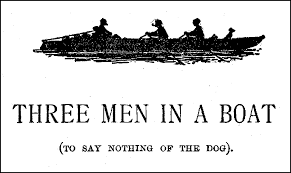Three Men in a Boat (not to mention the dog)
by Jerome K Jerome
1889
Mildly amusing. Whimsical. Harmless These are the words that come to mind when I reflect on the experience of reading this Victorian “classic”. For some reason, while many comic novels age appallingly, Three Men in a Boat seems bullet-proof against the passage of time. It is feather-light – there is no plot to speak of, very few events, no characterisation, or only the barest. The title sums up pretty much all you need to know about the novel – three middle class single men of indeterminate age or occupation take a short trip in a rowing boat up the Thames. It rains. They fall in occasionally. The narrator tells several stories of similar incidents on similar trips. These stories all follow the same pattern – the principal character is hugely over-confident in his own abilities – to sail, hang a picture, pack a bag, navigate a maze etc. – and retains this over-confidence in the face of every failure.
 I am clearly missing something, because many online reviewers describe this novel as “laugh out loud”, and it has never been out of print. The lead review in Amazon goes to far as to say “If you don’t love this book, and don’t weep laughing whilst reading it, then there’s something wrong with you”. I can’t recall ever weep laughing at any novel, let alone one with so flimsy an appeal. There is admittedly a whimsical charm to the whole enterprise, and the appeal to a late Victorian bygone era where the outside world rarely intrudes is clear. There are however a few points in the novel where this approach is discarded, and these jar badly. Mostly these are the scenic descriptions which were the novel’s original premise, (it was commissioned as a travel book) and they do not fit at all with the tone of the rest. But there is also a casually gratuitous use of a racial slur – the n-word – which may have been acceptable in the 1880’s but is hateful now. Possibly even worse, there is a description of a suicide. I can only assume Jerome included this distressing scene – a woman falls pregnant without being married, and, shunned by her family and friends, she finally ends it all by drowning herself in the Thames, to be discovered by our three men – as a contrast to the nonsense about frying pans and banjos. Victorians were famously mawkish and sentimental, so presumably this also seen as justification for this scene, but to a contemporary reader it is deeply uncomfortable.
I am clearly missing something, because many online reviewers describe this novel as “laugh out loud”, and it has never been out of print. The lead review in Amazon goes to far as to say “If you don’t love this book, and don’t weep laughing whilst reading it, then there’s something wrong with you”. I can’t recall ever weep laughing at any novel, let alone one with so flimsy an appeal. There is admittedly a whimsical charm to the whole enterprise, and the appeal to a late Victorian bygone era where the outside world rarely intrudes is clear. There are however a few points in the novel where this approach is discarded, and these jar badly. Mostly these are the scenic descriptions which were the novel’s original premise, (it was commissioned as a travel book) and they do not fit at all with the tone of the rest. But there is also a casually gratuitous use of a racial slur – the n-word – which may have been acceptable in the 1880’s but is hateful now. Possibly even worse, there is a description of a suicide. I can only assume Jerome included this distressing scene – a woman falls pregnant without being married, and, shunned by her family and friends, she finally ends it all by drowning herself in the Thames, to be discovered by our three men – as a contrast to the nonsense about frying pans and banjos. Victorians were famously mawkish and sentimental, so presumably this also seen as justification for this scene, but to a contemporary reader it is deeply uncomfortable.


No comments:
Post a Comment